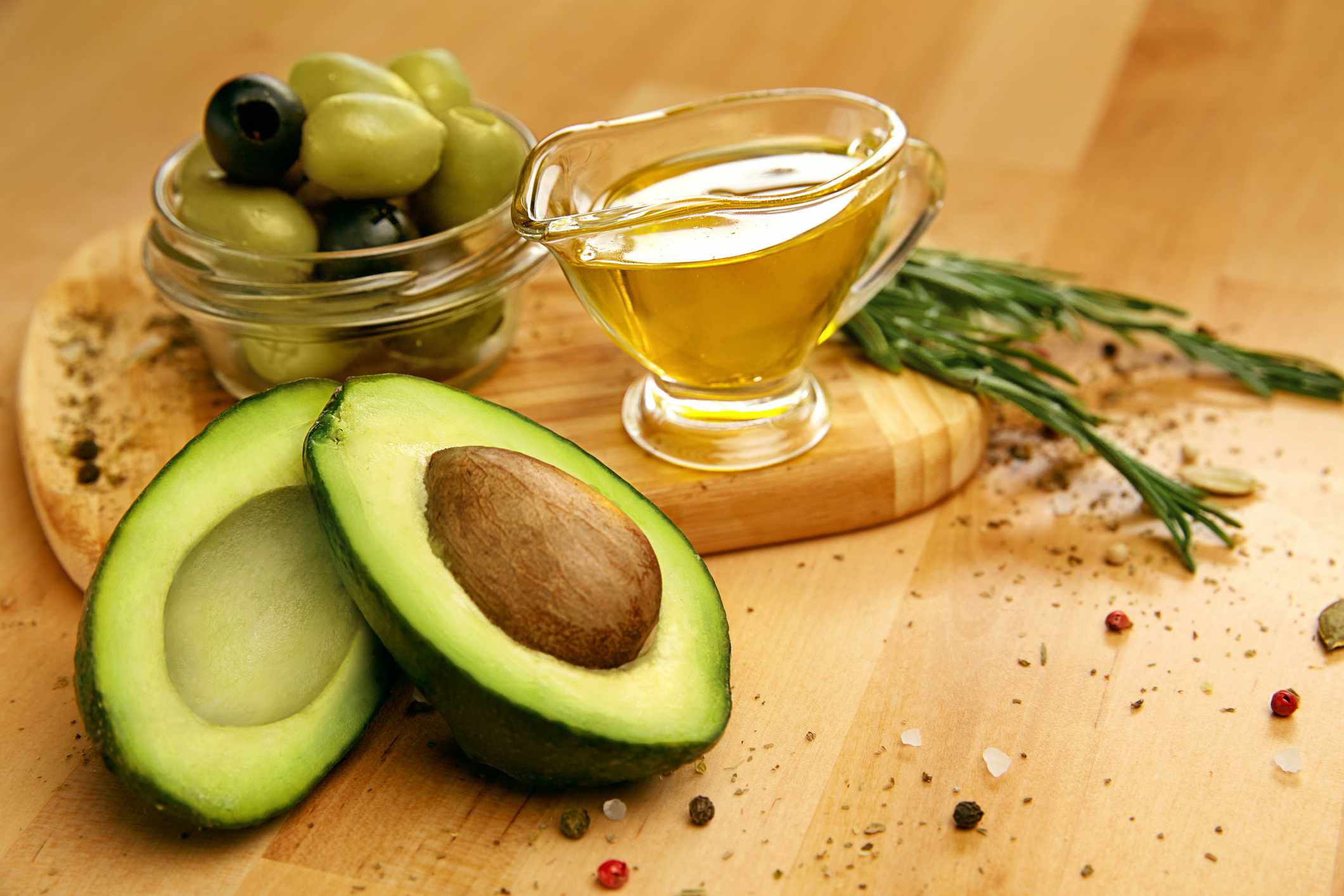
:max_bytes(150000):strip_icc():format(jpeg)/Health-GettyImages-974251806-bee639463a554149a83565ac50221759.jpg)
Olive oil is extracted from the fruit of the olive tree (Olea europaea L.). It is the predominant fat consumed in the Mediterranean diet, renowned for its long-standing benefits for longevity. Several studies have linked olive oil consumption to improved overall health.
Avocado oil is also extracted from the fruit of its respective tree (Persea Americana). Growing in popularity, avocado oil is produced mainly in the United States, Mexico, New Zealand, Chile, and South Africa. Its health value is due in part to its high concentration of monounsaturated fats (MUFAs) and minimal saturated fats, similar to olive oil.
Olive oil and avocado oil are both healthy fat alternatives to saturated fats like butter and cream. They may help lower the risk of heart disease and its complications. Experts advise keeping saturated fat intake below 10% of your daily diet.
Olive oil is highly valued for its rich flavor and health-promoting compounds, including tocopherols (like vitamin E).
It is an excellent source of MUFAs (over 60% concentration), particularly oleic acid, which is associated with lowering blood pressure and reducing the risk of heart disease. Oleic acid has also been shown to help reduce ulcers and support gastrointestinal health by promoting a diverse gut microbiome, which is essential for digestion, nutrient absorption, and overall immune function.
Olive oil also contains several bioactive compounds, including blood-pressure-lowering phytosterols, disease-fighting phenolic compounds, and antioxidant-rich plant pigments such as chlorophyll and carotenoids.
Extra virgin olive oil (EVOO) is considered the healthiest version as it retains more of its beneficial nutrients and compounds. Unrefined and cold-pressed, EVOO contains a low free fatty acid profile (less than 0.8%), which means it is not likely to cause inflammation.
Downsides
While olive oil is suitable for sautéing (around 350 degrees Fahrenheit or 177 degrees Celsius), cooking at high temperatures can degrade some of the oil’s beneficial nutrients and diminish its rich flavor.
Prolonged cooking at high heat can also lower its smoke point, causing it to smoke and potentially release harmful toxins, even at temperatures that were once considered safe for the oil’s stability.
If not stored properly, olive oil can go bad due to oxidation over time, despite its high content of natural antioxidants like vitamin E. Storing it in a dark container can help reduce degradation and maintain its shelf life.
Similar to olive oil, avocado oil has an above 60% concentration of MUFAs, with a high percentage of oleic acid. This heart-protective fatty acid profile gives the oil an advantage in stability, quality of flavor, and nutrition in a variety of cooking methods, including stir-frying and sautéing.
Avocado oil also has a high concentration of phytosterols, most abundantly β-sitosterol, a compound with anti-inflammatory and cancer-preventative properties. It also has the antioxidant properties of carotenoids and chlorophylls, which play a role in the oil’s stability.
Like olive oil, avocado oil can be produced using cold-pressed methods without chemical solvents. This unrefined version (sometimes called extra virgin) retains a higher antioxidant yield.
Downsides
As with olive oil, heating can degrade some of avocado oil’s bioactive compounds, including unsaturated fatty acids, antioxidants (including vitamin E), and phytosterols. Storing the oil in the dark can help preserve its shelf life and prevent rapid deterioration of its beneficial chlorophyll.
Avocado oil is also a high-calorie food (slightly higher than olive oil), so it’s important to moderate your intake to prevent weight gain.
Olive and avocado oil are both high in monounsaturated fats and low in saturated fats. Avocado oil is slightly higher in calories and overall fat content. Below is a nutritional comparison of one tablespoon of each oil.
| Olive oil (1 tablespoon) | Avocado oil (1 tablespoon) | |
| Calories | 119 | 124 |
| Fat | 13.5 grams (g) | 14 g |
| Saturated fatty acids | 1.86 g | 1.62 g |
| Monounsaturated fatty acids | 9.86 g | 9.88 g |
| Polyunsaturated fatty acids | 1.42 g | 1.89 g |
| Iron | 0.076 milligrams (mcg) | 0 mg |
| Vitamin E (alpha tocopherol) | 1.94 mg | 0 mg |
| Vitamin K | 8.13 mcg | 0 mcg |
Avocado—the fruit that produces avocado oil—is a good source of vitamins K and E. However, available data shows one tablespoon of avocado oil may be too small to detect significant amounts of these vitamins.
Data shows olive oil may provide more vitamin E (alpha tocopherol) than avocado oil. However, some research suggests that avocado oil may contain as much as 7.9-19 milligrams of alpha tocopherols per 100 grams of oil.
Avocado oil has a higher concentration of cholesterol-reducing phytosterols than olive oil, with each containing 4.5 milligrams per gram and 3.3 milligrams per gram, respectively.
Still, both oils are considered good sources of phytosterols and vitamin E.
Both oils are suitable for cooking with heat. Avocado oil has a higher smoke point (>482 degrees Fahrenheit or 250 degrees Celsius), which means it can withstand higher temperatures than olive oil without smoking.
Although lower, the smoke point of extra virgin olive oil is 376 degrees Fahrenheit (191 degrees Celsius), meaning you can still use olive oil for higher-heat cooking, such as roasting vegetables.
However, high-heat cooking methods over prolonged periods can increase olive oil’s FFAs (free fatty acids), degrade the oil, and produce a potentially toxic compound called acrolein. The same can occur in avocado oil.
Both olive oil and avocado oil provide essential fatty acids that help with the absorption of fat-soluble vitamins. Since heating can degrade certain health-promoting nutrients in oils, using them raw maximizes their nutritional benefits.
A few ways to enjoy raw oil include:
- Mix it with an acid like lemon or vinegar to make salad dressing
- Drizzle it on top of warm or cold soups to enhance the dish’s texture and flavor
- Sprinkle it on crunchy, lightly steamed vegetables or a serving of grains like rice, farro, or buckwheat
- Use it as an alternative for butter on toast
- Pour it over hummus for flavor and to prevent the hummus from drying out in the fridge.
The oils have different levels of intensity and flavor, each tasting slightly like their respective fruits. Olive oil has a more distinct flavor, while avocado oil is milder. Your choice will mostly depend on your preference.
If you’re looking to add a boost of a more “fruity” flavor or pungency to your foods, olive oil is a great choice. It enhances the flavor of simple dishes like hummus and elevates salads like Caprese with tomatoes, mozzarella, and basil. It also pairs well with classic leafy greens like spinach and green leaf lettuce.
If you want the fresh ingredients in your salad dressing to shine, avocado oil is the way to go, as it delivers a mild flavor of its fruit. However, there are more delicate olive varieties available that won’t overpower fruit combinations, delicate leafy greens, like butter lettuce or mâché, or fresh herbs.
Cost is another factor to consider. Extra virgin olive oils can vary in price but tend to be more expensive than refined versions. Avocado oils are generally more expensive than olive oils. However, the price can vary significantly depending on the brand, the type of oil (EVOO or refined), and any sales that may be available.
Both olive oil and avocado oil are healthy options that may help reduce the risk of heart disease when used in place of saturated fats like butter. They both provide ample amounts of monounsaturated fatty acids (MUFAs) and have minimal saturated fats.
Olive oil has more extensive research regarding its heart-health benefits, particularly as part of the Mediterranean diet. It has been used for thousands of years, stemming from the Mediterranean region. Avocado oil has a similar concentration of MUFAs and antioxidant nutrients, yielding benefits for heart disease prevention, gut health, and immunity. However, this oil is newer in popularity.
Since both oils are processed from their fruits, neither is a seed oil. Seed oils tend to have higher concentrations of polyunsaturated fats (PUFAs) over MUFAs. Concerns about seed oils stem from their high linoleic acid content, a PUFA. While linoleic acid has some heart-protective benefits, some studies indicate it may also contribute to inflammation.
Both olive oil and avocado oil are healthy oils that can replace foods high in saturated fats, such as butter and cream, to help lower the risk of heart disease and related complications. Experts recommend that saturated fat intake is less than 10% of your daily food intake.
Unlike seed oils, olive and avocado oil are both extracted from the fruit of their trees. They contain a high percentage of monounsaturated fats, contributing to their heart and gut health benefits.
While both oils can be used to sauté, pan-fry, and bake, higher temperatures can reduce some of their flavor and nutrients. Prolonged cooking times at high heat can unleash potential toxins. Heating at lower temperatures can help preserve the oils’ beneficial compounds. Enjoying these oils raw can also help you get the most nutrients.








